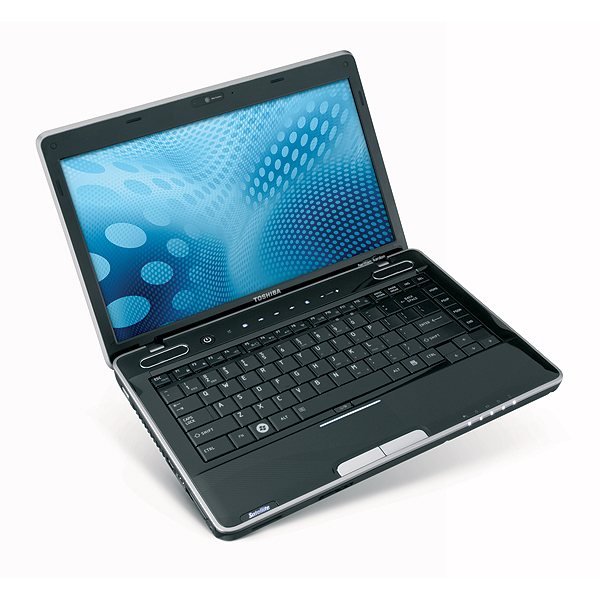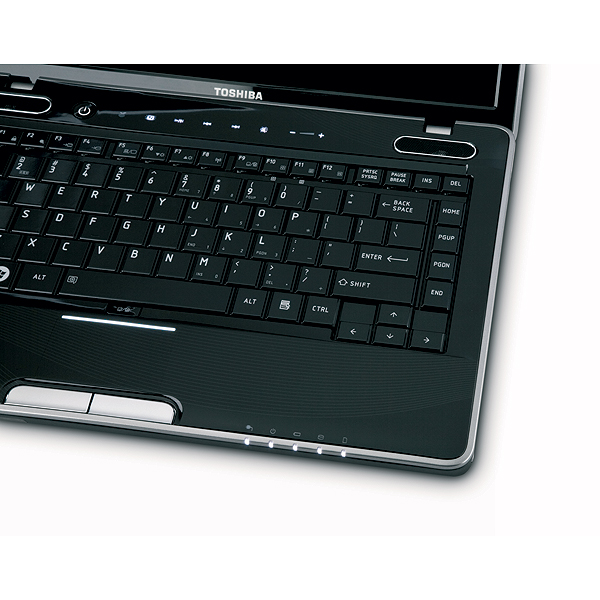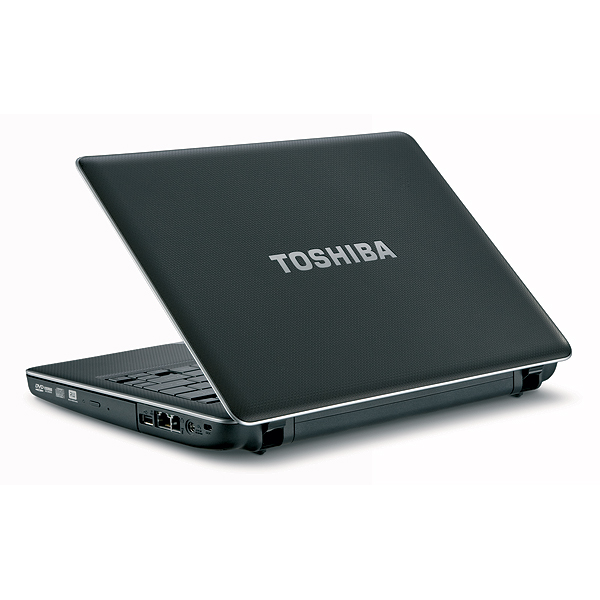Toshiba Satellite U505 Serie
 Processore: Intel Core 2 Duo P7350, Intel Core 2 Duo P7450, Intel Core 2 Duo T6600, Intel Core i5 430M
Processore: Intel Core 2 Duo P7350, Intel Core 2 Duo P7450, Intel Core 2 Duo T6600, Intel Core i5 430MScheda grafica: Intel Graphics Media Accelerator (GMA) 4500MHD, Intel Graphics Media Accelerator (GMA) HD Graphics
Schermo: 13.30 pollici
Peso: 2.1kg, 2.2kg, 2.5kg
Prezzo: 700, 800 euro
Media dei 6 punteggi (dalle 6 recensioni)
Toshiba Satellite U505-S2980
Specifiche tecniche
 Notebook: Toshiba Satellite U505-S2980
Notebook: Toshiba Satellite U505-S2980Processore: Intel Core 2 Duo T6600
Scheda grafica: Intel Graphics Media Accelerator (GMA) 4500MHD
Schermo: 13.30 pollici, 16:10, 1280 x 800 pixels
Peso: 2.2kg
Prezzo: 700 euro
Links: Toshiba homepage Toshiba sezione notebook Satellite U505-S2980 (modello)
Price comparison
Punteggio medio:
recensioni esterne
Sorgente: PC World
 EN→IT Archive.org version
EN→IT Archive.org versionThough I find a lot to like about the U505, it's ironic that the main selling point is also what's holding this laptop back--the touchscreen. A user's experience with a notebook is often going to depend chiefly on the keyboard and the screen--the two most direct ways of interacting with it. You can fit all the hardware you want under the hood, but if these two don't hold up their end of the bargain, people aren't going to want to use it. The touchscreen is a cute gimmick whose poor visual quality unfortunately brings the whole thing down a peg.
Singola recensione, disponibile online, Medio, Data: 11/24/2009
Valutazione: Punteggio totale: 70%
Sorgente: Laptop Mag
 EN→IT Archive.org version
EN→IT Archive.org versionOn the whole, the Toshiba U505-S2980-T is a pretty good Windows 7 touch notebook—and it offers a healthy dose of style along with plenty of muscle. However, at $1,049, this laptop is more expensive than a non-touchscreen version with better graphics. That’s quite a lot to pay for a feature that results in a heavier chassis and a display that’s less crisp. While it lacks a touchscreen, the redesigned unibdody MacBook, for $50 less, offers generally better performance and almost two additional hours of battery life in a sleeker design.
Singola recensione, disponibile online, Lungo, Data: 11/02/2009
Valutazione: Punteggio totale: 60%
Toshiba Satellite U505-S2940
Specifiche tecniche
 Notebook: Toshiba Satellite U505-S2940
Notebook: Toshiba Satellite U505-S2940Processore: Intel Core 2 Duo P7350
Scheda grafica: Intel Graphics Media Accelerator (GMA) 4500MHD
Schermo: 13.30 pollici, 16:10, 1280 x 800 pixels
Peso: 2.5kg
Prezzo: 700 euro
Links: Toshiba homepage Toshiba sezione notebook
Price comparison
Punteggio medio:
recensioni esterne
Sorgente: PC World
 EN→IT Archive.org version
EN→IT Archive.org versionToshiba's latest addition to the Satellite laptop line, the U505 S2940, isn't just a good-looking notebook, it also has some excellent design features that will please anyone needing a portable for general computing and entertainment. Coming in under $1000 (our review unit sells for $949 as of 9/1/09), the U505 offers just enough juice for multitasking without feeling cramped. A solid choice for general computing and entertainment if you don’t need the slimmest (or lightest) travel mate.
Singola recensione, disponibile online, Medio, Data: 09/09/2009
Valutazione: Punteggio totale: 78% prestazioni: 71% caratteristiche: 80%
Toshiba Satellite U505-S2970
Specifiche tecniche
 Notebook: Toshiba Satellite U505-S2970
Notebook: Toshiba Satellite U505-S2970Processore: Intel Core 2 Duo P7450
Scheda grafica: Intel Graphics Media Accelerator (GMA) 4500MHD
Schermo: 13.30 pollici, 16:10, 1280 x 800 pixels
Peso: 2.1kg
Prezzo: 700 euro
Links: Toshiba homepage Toshiba sezione notebook
Price comparison
Punteggio medio:
recensioni esterne
Sorgente: CNet
 EN→IT Archive.org version
EN→IT Archive.org versionThe Toshiba Satellite U505-S2970 is a thin-and-light laptop that is neither thin nor light. It feels solidly built, but this is a 13.3-inch laptop that is only a hair lighter than the 14.1-inch Toshiba Satellite E105-S1802. We prefer the larger Satellite; though it costs $50 more for roughly the same components, it features a more comfortable keyboard, better battery life, and a longer warranty. The Toshiba Satellite U505-S2870 is rather tank-like for a 13.3-inch thin-and-light. We'd be more willing to tote it around if its heavy-armor feel extended to the flimsy keyboard.
Singola recensione, disponibile online, Medio, Data: 11/24/2009
Valutazione: Punteggio totale: 66% prezzo: 70% caratteristiche: 60% mobilità: 70%
Toshiba Satellite U505-S2010
Specifiche tecniche
 Notebook: Toshiba Satellite U505-S2010
Notebook: Toshiba Satellite U505-S2010Processore: Intel Core i5 430M
Scheda grafica: Intel Graphics Media Accelerator (GMA) HD Graphics
Schermo: 13.30 pollici, 16:10, 1280 x 800 pixels
Peso: 2.2kg
Prezzo: 800 euro
Links: Toshiba homepage Toshiba sezione notebook
Price comparison
Punteggio medio:
recensioni esterne
Sorgente: Digital Trends
 EN→IT Archive.org version
EN→IT Archive.org versionToshiba’s Satellite U505 series notebooks actually manage to cram quite a bit of power into a 13.3-inch form factor, even if they do lose both some portability and battery life in the process. With models between $690 and $1,100, you’ll also find plenty of wiggle room to shed the features you don’t need – like the touch screen. While we wouldn’t recommend the specific U505 model we reviewed (S2010) because of this rather useless feature (which both drives up price and diminishes image quality), the lower-end models may satisfy those who want a 13.3-inch notebook without sacrificing the creature comforts and power of larger notebooks.
Singola recensione, disponibile online, Medio, Data: 04/06/2010
Valutazione: Punteggio totale: 70%
Sorgente: Comp Reviews
 EN→IT Archive.org version
EN→IT Archive.org versionToshiba's updated Satellite U505 laptop adds a fair amount of performance thanks to the new Core i5 processor and functionality with the multitouch enabled display. The $1000 street price makes this a very affordable multitouch enabled ultraportable. The system still is one of the bulkiest on the market for a 13-inch laptop and its battery life is not that strong compared new ultraportables on the market but it does offer more performance and extra ports as a trade-off.
Singola recensione, disponibile online, Corto, Data: 03/26/2010
Valutazione: Punteggio totale: 80%
Commenti
Toshiba: Toshiba Corporation è un conglomerato o gruppo tecnologico giapponese. L'azienda è stata fondata nel 1939 e nel 1978 Toshiba è diventata il nome ufficiale dell'azienda. I prodotti e i servizi dell'azienda includono energia, sistemi di infrastrutture industriali e sociali, ascensori e scale mobili, componenti elettronici, semiconduttori, dischi rigidi, stampanti, batterie, illuminazione, logistica e tecnologia dell'informazione. Toshiba è stato uno dei maggiori produttori di personal computer, elettronica di consumo, elettrodomestici e apparecchiature mediche.
Soltanto i giochi datasi possono essere giocati in modo fluido con questi chips grafici (se non richiedono troppe prestazioni). I cores con memoria grafica condivisa in questa categoria hanno il vantaggio delle minori emissioni di calore e della maggiore autonomia della batteria. Per ufficio, internet, image processing, e video editing queste schede grafiche sono utilizzabili senza particolari problematiche.
Intel Graphics Media Accelerator (GMA) 4500MHD: Scheda grafica intregrata basata sul chipset GM45 (Montevina). Più performante rispetto alla vecchia GMA X3100 grazie ha due shader in più ed ad un clock più elevato. Rimane, comunque, non consigliata per i giocatori più incalliti. Il processore video integrato è capace di codificare video HD (AVC/VC-2/MPEG2). Ad esempio permette la riproduzione di video HD compatibile con i requisiti del logo Blu-Ray, con il supporto nativo per unità Blu-Ray.
Intel Graphics Media Accelerator (GMA) HD Graphics:
>> Ulteriori informazioni le potete trovare nel nostroConfronto delle schede grafiche e nella nostra Lista dei Benchmark.
Intel Core 2 Duo: Questo è il successore del Core Duo e del Core Solo con una pipeline più lunga ed il 5-20% di velocità in più senza avere maggiore consumo di energia. Come aggiunta al design del Core Duo esiste un quarto decoder, una unità amplificata SSE ed una unità logica aritmetica (ALU) addizionale. Il Core 2 Duo per portatili è identico al processore per desktop Core 2 Duo ma il processore per portatili lavora con un voltaggio inferiore (0.95 a 1188 Volt) ed un Frontside bus clock inferiore (1066 vs 667 MHz). Le prestazioni di portatili con clock equivalenti sono inferiori del 20-25% rispetto ai PCs Desktop a causa del Frontside bus clock inferiore e agli hard disks più lenti.
T6600: Processore dual core Core 2 di fascia base con una piccola level 2 cache di 2MB senza funzioni di virtualizzazione.
P7350: Processore Core 2 Duo di fascia base con 3 MB di Level 2 Cache e grazie ai 25 Watt di TDP è adatto ai portatili da 13".
P7450: Processore Core 2 Duo di livello base con 3 MB di Level 2 Cache e grazie ai 25 Watt di TDP adatto anche ai portatili da 13".
Intel Core i5:
430M: Il Core i5-430M è una CPU dual core di media classe che sfrutta solo 3 MB di L3 Cache (rispetto alla I7-640M) ed ha un clock tra 2.26-2.53 GHz (Turbo Mode). Inoltre, nella 430M mancano VT-d, trusted Execution e funzioni AES. Grazie all'Hyperthreading, possono essere gestiti 4 threads contemporaneamente. Nel pacchetto sono incluse anche una scheda grafica integrata (Intel HD Graphics da 500-733 MHz) ed un controller memoria DDR3.
>>Ulteriori informazioni le potete trovare nel nostroConfronto dei processori per portatili.
>> Per scoprire come è la risoluzione del vostro schermo, andate a vedere la nostraLista DPI.
2.1 kg:
Di solito subnotebooks, ultrabooks e portatili leggeri con diagonale del display da 12-16” pesando di più.
2.5 kg:
Questo è il tipico peso del portatili con diagonale del display da 14-16”.
70.67%: Questo punteggio è negativo. La maggior parte dei portatili hanno fatto di meglio. Se ne sconsiglia l'acquisto.
>> Ulteriori informazioni le potete trovare nella nostra Guida all'acquisto di un portatile.

































